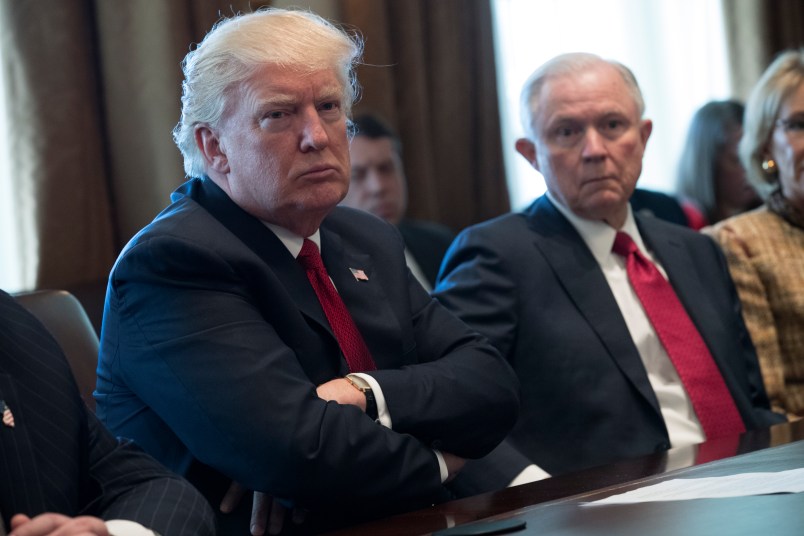Over the course of today there was a rush of nugget-sized revelations about the Trump/Russia investigation. Overnight there was news that FBI Director Christopher Wray had threatened to resign. Then we learned that Jeff Sessions had sat for an extended interview with Robert Mueller’s investigators. A bit later we learned that James Comey was interviewed last year. None of these revelations was that big in itself. But there were enough of them (including others not mentioned here) that we put together a round up of these little pops of information just to help keep track. By the end of the day though the different nuggets began to fit together, not as a scattershot of discrete revelations but several parts of a unified whole.
We thought that Robert Mueller had one channel of his probe investigating collusion and another focusing on obstruction of justice. The latter channel appeared to focus on two incidents involving James Comey in February (the request for Michael Flynn) and May (Comey’s firing). Now that channel seems much broader, both in scope and chronology. An afternoon article in The Washington Post suggested that one focus of the interview with Jeff Sessions turned on the President’s pressure on Sessions to resign, which took place after Comey’s dismissal. Mueller was examining this episode as part of a potential pattern of conduct tied to the two aforementioned incidents. This is unquestionably an expansive interpretation of Mueller’s brief. There is also little question that bullying Sessions is part of a broader pattern of the President either obstructing specific investigations or harnessing the machinery of law enforcement to protect himself personally.
There are a few points to note in this context. First, the news that Christopher Wray threatened to resign over pressure to purge the FBI of perceived Comey allies came after a report in the same publication – Axios – that suggested that Sessions had urged Wray to fire Comey-era FBI leadership. The first report suggested that Wray was pliant. The second sent a very different signal. Perhaps these are successive revelations from one source. But I doubt it. It sounds more like different sources of information jousting to establish a set of facts on their terms. I would be very cautious about assuming that we know the full story about Trump’s and Sessions’ pressure on Wray to ‘clean house at the FBI’ and how Wray responded.
This raises another point. The two instances of possible obstruction that we’ve known about for months are Trump’s request to Comey to let Flynn off the hook and Trump’s subsequent firing of Comey. We only know about these two events because they were done in public. Comey’s firing was obviously public and the Flynn revelation came out of the congressional testimony that Comey’s firing spurred. To be clear, we don’t know about these incidents because they’re the worst examples. We know about them because specific events forced their disclosure. We’ve had lots of hints of other shenanigans but it’s all been hazy and uncertain, likely because the parties have little reason to go public. There’s probably quite a lot on this front we do not know but which Mueller’s investigators do know. It is all but certain.
That gets to an even bigger point. Today DC is buzzing about a “secret memo” Devin Nunes staffers wrote about alleged FBI/CIA anti-Trump wrongdoing during the 2016 campaign. He has made this classified memo available to all members of the House. He has refused to share it with the FBI – the organization accused of wrongdoing. He and the White House have worked to create a rightwing faux groundswell of demands to “release the memo” to the public. Russian intelligence backed social media accounts have worked to amplify the “release the memo” push.
We can dig into the arcana of these claims and conspiracy theories. But all of this – every last bit of it – is the work of the White House and its defenders on Capitol Hill making war on the Mueller probe. All of this is an effort to disrupt and discredit the Mueller probe. And it’s start inside the Trump White House. It goes all the way back to Flynn’s attempt to snoop on the investigation into himself exactly one year ago.
In a political sense, all of this amounts to obstruction. It has gone as far as demands for purges of the FBI, the Department of Justice, even jailing various perceived Trump law enforcement enemies who have been part of this on-going probe. But what counts in a political sense does not necessarily count in a legal sense. Certainly, the efforts of corrupt members of Congress to defeat an investigation into a Presidential ally go far beyond anything the obstruction statutes are meant to encompass.
Let me be clear: I am not saying that Robert Mueller is going to start investigating Devin Nunes for obstruction. My point is that if Mueller is taking an expansive view of President Trump’s wrongdoing (as the scrutiny of the Sessions bullying suggests) and subversion of the rule of law it may be difficult to draw a bright line between Trump’s pressure on Sessions and the various ways Trump, his cronies and allies have worked with people like Nunes and others to protect himself by defeating Mueller’s investigation.
These are not statutory crimes. They political crimes, subversion of the political order and the rule of law that ordinary statutes are not designed to grapple with. Where this will lead is not at all clear.






